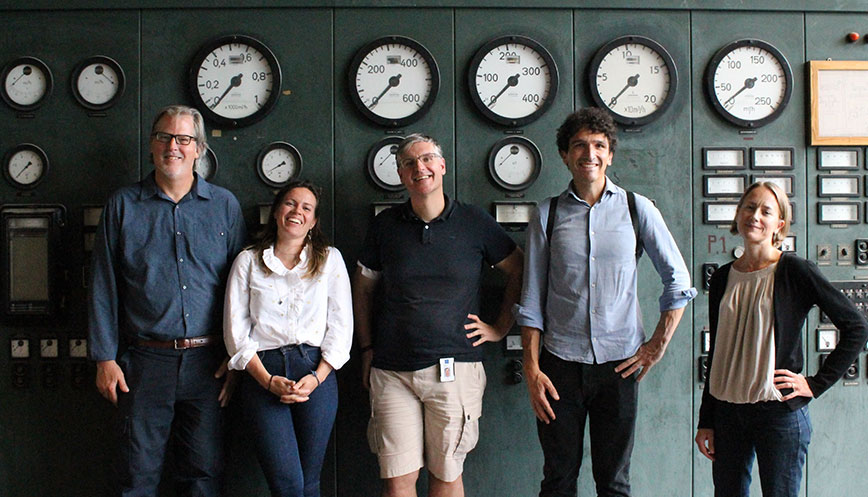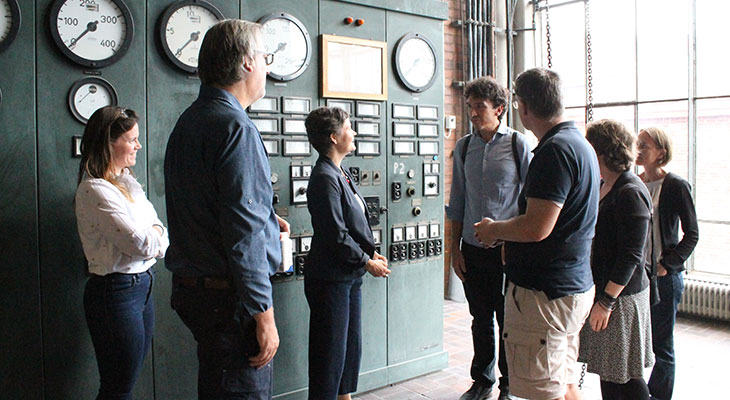“Knowledge and energy are needed to address the climate crisis”
Report from joint event held by KTH Energy and Industrial Transformation Platforms

In September, KTH Energy Platform, together with KTH’s Industrial Transformation Platform, KTH Climate Action Center and NAVET hosted a dialogue about the impact of ongoing climate change on people and society.
The “Finding knowledge and energy to deal with the meta-crisis” event attracted some 50 researchers, students and KTH employees to the KTH Värmekraftverk venue, which once heated KTH with coal. Dancers from Stockholm University of the Arts (SKH) opened the evening with two performances on the climate theme, (please see link in the fact box below).
Christophe Duwig, Deputy Director of KTH Energy Platform, then welcomed participants to the dialogue.
“Today, we’re focusing on the non-technical issues associated with rapid societal transformation and the climate crisis. Engineers often master the technical side of the challenge, but they’re also human beings with emotions, doubts and sometimes anxiety. In this forum, we open up a broader conversation about our feelings with the help of our guest speakers,” Duwig says.
Smaller amounts of energy
Shortly before the talk started, we had a chat with the two guest speakers, Nate Hagens, Director of The Institute for the Study of Energy & Our Future (ISEOF), and Olivia Lazard, peace researcher and fellow at Carnegie Europe, specialising in climate geopolitics. Nate Hagens runs a very popular podcast focusing on the environment and sustainability, The Great Simplification. Both speakers highlighted the need to embrace the energy technologies that can reduce our dependence on fossil fuels.
“But the truth is that in the future, we’ll simply have to use less energy than we do today. However, it’s political suicide to say that at the moment, and will be until the day we’re forced to face that truth,” says Hagens.
Having said that, Sweden and Scandinavia have suitable cultural and economic conditions to become pilots for a different life, he said.
“Low population density in relation to existing natural resources, and the well-established social system with a stable structure make this possible. You’re well placed to handle some of the changes that we will all be forced to make in the future.”

Lack of reflection and balance
However, Lazard pointed to the impact of Sweden’s rejection of the EU’s new Nature Restoration Law.
“It shows that there is a lack of fundamental reflection on the balance between consideration for nature and technology, which is key to a more resilient economy. This balance will enable us to handle the geopolitical crises that will arise in the future,” Lazard says.
In this respect, Lazard mentioned the war in Ukraine and argued that one of Russia’s reasons for invading Ukraine – in light of the climate crisis – was to establish a future geopolitical and geoeconomic advantage. Russia already controls approximately 20 per cent of the world’s freshwater resources, she added.
“If we fail to invest in regenerative agriculture and change our relationship with nature, we will surrender power to countries like Russia. Sweden has been quick to invest in a new energy infrastructure, but at the same time you have an apparently short-term mindset in relation to nature.”
Stockholm, however, has profiled itself as a political leader on climate issues in Europe, Lazard says.
“That’s why it’s important for me to come here. And above all, to meet students who still have the power to define what role they will play in the future and which technologies will get us there.”
She also stressed how engineers have a special part to play by stepping out of their traditional roles as specialists.
“They need to put their knowledge in a broader societal context because we’re at a crossroads today where human evolution interacts with technological development,” Lazard says.
Informal, open discussions
The conversation during the evening was very informal, in part because all participants gathered in a close circle in the large hall. The discussion included many different aspects of the ongoing climate crisis, with comparisons between different countries’ climate efforts and differences that exist in various parts of the world. The ongoing shift from types of fossil energy and technologies to sustainable solutions was also discussed.
Students from countries that have already been hit hard by climate change made themselves heard in particular. And they asked why our adaptation to the climate crisis is going so slowly.
“It’s easy to despair or fall into a sort of nihilism, but that is not what we need right now. We’re not yet at the inflection point we want to be at. But, conversations like this are happening all over the world, and it’s these conversations that will make a difference by shaping the future,” Lazard says.
Hagen’s advice to the students present was to measure their self-worth in terms other than money, especially in a world where energy and material things are becoming increasingly expensive.
“And try not to worry about solving the entire climate problem at once; rather, focus on something that you’re passionate about, that speaks to you, and you’ll move in the right direction towards the goal.”
Watch the entire dialogue on KTH NAVET YouTube channel
Text: Magnus Trogen Pahlén
